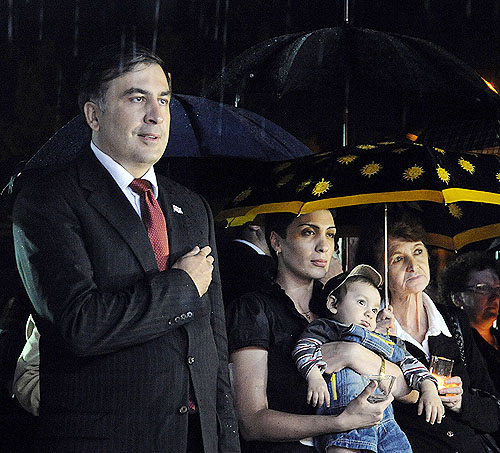|
 |
|
REMEMBERING CONFLICT: Georgian President Mikheil Saakashvili attends a rally in Gori near South Ossetia on August 7 to commemorate the first anniversary of Georgia's armed conflict with Russia (XINHUA/AFP) |
August seems to have become the "hot season" for Russian-Georgian tensions over the past two years. In August 2008, eight days of heavy fighting broke out between the two countries. Then, this August, Georgia formally quit the Commonwealth of Independent States (CIS), a regional organization grouping former Soviet republics.
Georgia's withdrawal from the CIS follows both internal and external reasoning. The external influence is the power game between Russia and the United States in Georgia; the internal reason is a domestic political crisis that President Mikheil Saakashvili is caught in, including separation of restive regions, coupled with pressure from the political opposition.
Sharp conflicts
Georgia's withdrawal from the CIS highlights the sharp overall conflict between Georgia and Russia. Since Georgia declared independence in the early 1990s, Georgian-Russian conflicts have been ongoing—and, of course, upgraded to war.
Generally speaking, their disputes focus on three issues: the presence of military bases, separatist activities and Georgia's NATO membership.
Upon declaring independence, Georgia immediately asked Moscow to withdraw its forces from its four military bases inside Georgia. However, the issue festered for years until the end of 2008, when Russia withdrew from its last military base.
Although conflicts on the military bases have ceased, resolving the separation issue appears all but impossible in the foreseeable future. In fact, it remains the root of all conflicts between the two countries.
The separation issue refers to the quest of Abkhazia and South Ossetia for independence. During former President Eduard Shevardnadze's administration, Georgia and Russia once worked jointly on this issue. Russia had emphasized the integrity of Georgian territory, and called for a political resolution.
After Saakashvili took over in 2004, however, he set out to regain lost territory and strengthened control over Abkhazia and South Ossetia.
With the two regions intensifying separatist actions, Georgia became more and more dissatisfied with Moscow, holding that Russia had cast a huge influence on the two regions, which led to their "Russianization."
More than 90 percent of the residents in the two regions had Russian nationality. In November 2006, South Ossetia held a referendum in which an overwhelming proportion of people voted for independence.
In addition, Georgia criticized Russia for providing economic and military aid to the two regions. Russia lifted economic sanctions for Abkhazia in March 2008, and declared its intention to strengthen cooperation with Abkhazia and South Ossetia in the next month, promising to provide them with aid. All these actions irritated Georgia, and resulted in a deterioration of relations—finally leading to military conflict in August 2008.
Georgia's Western-leaning orientation has been another bone of contention in recent years. Since Georgia declared independence, one of its biggest goals has been to join NATO.
After Saakashvili took office, Georgia strengthened its cooperation with NATO and accelerated integration, with a hope of completion by 2009. In order to join NATO, Georgia carried out a series of reforms in the fields of politics, economy and especially military affairs.
On the other hand, NATO is conducting military cooperation with Georgia, including offering military aid, providing training and holding joint military exercises. Russia has always opposed Georgia's joining NATO and expressed concern that, should Georgia join NATO, Abkhazia and South Ossetia would, in turn, declare independence.
Indeed, when it comes to Russian-Georgian relations, the separation issue plays an important role—one that is the basis for the stability of Saakashvili's rule. In particular, it was Saakashvili's stated task upon taking office to address this issue and, since it remains unresolved, it continues to be a thorn in the side of his administration.
| 